Revolutionizing Industries with AGI: How Artificial General Intelligence is Changing the Game
Artificial General Intelligence (AGI) is a rapidly evolving field of technology that has the potential to revolutionize industries across the board. AGI refers to a type of artificial intelligence that possesses the ability to understand, learn, and apply knowledge in a broad range of tasks. Unlike narrow AI, which is designed for specific tasks, AGI aims to mimic human intelligence and cognitive abilities.
As the capabilities of AGI continue to advance, businesses and industries are beginning to explore the potential applications of this technology. From healthcare and finance to transportation and entertainment, AGI has the power to transform the way we work, live, and interact with the world around us.
In this article, we will explore how AGI is revolutionizing industries and changing the game for businesses across the globe.
Healthcare
One of the most promising applications of AGI is in the field of healthcare. From diagnosing diseases to developing personalized treatment plans, AGI has the potential to revolutionize the way healthcare is delivered.
AGI-powered algorithms can analyze vast amounts of medical data, including patient records, genetic information, and clinical trials, to identify trends and patterns that may not be apparent to human doctors. This can lead to more accurate diagnoses, earlier detection of diseases, and more effective treatment plans.
In addition, AGI can help streamline administrative tasks, such as scheduling appointments, processing insurance claims, and managing medical records. This can free up healthcare professionals to focus on providing quality care to patients, leading to better outcomes and improved patient satisfaction.
Finance
In the financial industry, AGI is being used to automate tasks such as risk assessment, fraud detection, and investment analysis. By analyzing real-time market data and historical trends, AGI-powered algorithms can identify opportunities and risks that may not be apparent to human traders.
AGI can also help improve customer service by providing personalized recommendations and insights based on individual financial goals and preferences. This can lead to more tailored financial products and services that better meet the needs of customers.
Transportation
AGI is also revolutionizing the transportation industry, particularly in the development of autonomous vehicles. By combining sensor data with advanced algorithms, AGI-powered self-driving cars can navigate complex road conditions, anticipate potential hazards, and make split-second decisions to ensure the safety of passengers and pedestrians.
In addition, AGI can help optimize transportation networks by analyzing traffic patterns, predicting demand, and coordinating the movement of vehicles in real-time. This can lead to more efficient use of resources, reduced congestion, and improved air quality in urban areas.
Entertainment
In the entertainment industry, AGI is being used to create more immersive and engaging experiences for audiences. From virtual reality games to personalized content recommendations, AGI-powered algorithms can analyze user preferences and behaviors to deliver more relevant and engaging entertainment options.
AGI can also help streamline content creation and production processes, such as video editing, special effects, and sound design. This can lead to more cost-effective and efficient production workflows, allowing creators to focus on storytelling and creativity.
FAQs
Q: What is the difference between AGI and narrow AI?
A: AGI refers to artificial intelligence that possesses the ability to understand, learn, and apply knowledge in a broad range of tasks. Narrow AI, on the other hand, is designed for specific tasks and lacks the ability to generalize knowledge to new situations.
Q: How is AGI different from human intelligence?
A: While AGI aims to mimic human intelligence and cognitive abilities, it is still a long way from achieving the level of complexity and flexibility exhibited by the human brain. AGI is limited by the algorithms and data it is trained on, whereas human intelligence is influenced by emotions, intuition, and social interactions.
Q: What are the ethical implications of AGI?
A: As AGI becomes more advanced and integrated into everyday life, there are concerns about privacy, security, and bias in decision-making. It is important for businesses and policymakers to establish guidelines and regulations to ensure that AGI is used ethically and responsibly.
In conclusion, AGI has the potential to revolutionize industries across the board, from healthcare and finance to transportation and entertainment. By harnessing the power of artificial intelligence to mimic human intelligence and cognitive abilities, businesses can unlock new opportunities for innovation, efficiency, and growth. As AGI continues to evolve, it is important for businesses to stay informed about the latest developments and explore how this transformative technology can benefit their operations and customers.

